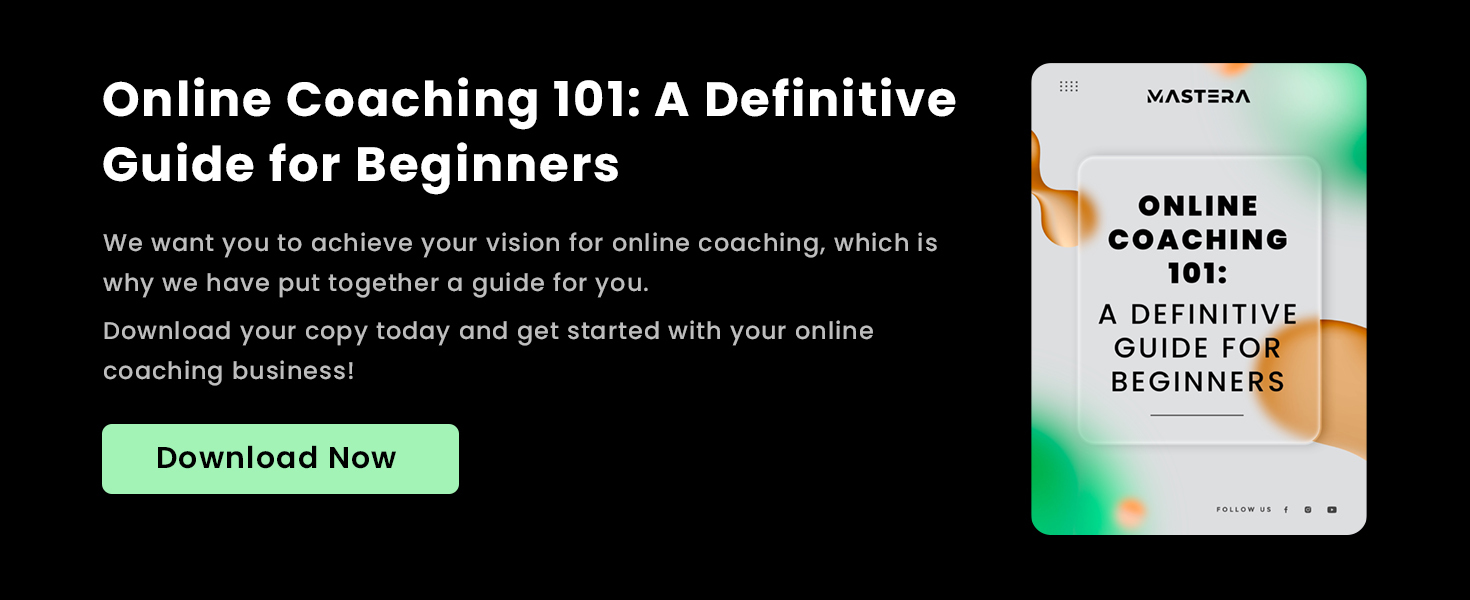Starting an online coaching business from scratch is no simple task – nor an easy one. There is a range of elements to think about – including your unique selling points, marketing tactics, credibility within your niche, and more.
But one of the most important things is attracting prospective clients. In this article, we’ll give you some insight into becoming a credible coach online.
In this article:
- What is an Online Coach?
- The Coaching Industry
- Types of Coaching
- A Coach’s Responsibility
- Establishing Credibility as a Coach
- Attracting Prospects to Your Coaching Practice
What is an Online Coach?
An online coach provides objectivity and support to a client while guiding them toward their desired goal.
This coaching service is usually monetized online, and coaches and clients meet virtually via online teaching platforms.
The Coaching Industry
The online coaching industry has boomed over the last decade, with the estimated market value growing from 707million USD in 2011 to an estimated 1.34 billion USD in 2022:

So, if you’re ready to join the coaching industry, now is definitely the time. Coaching is also known to give coaches as much joy and fulfillment as their clients. Let’s discuss the various style of coaching you can practice.
Types of Coaching
There are several niches that you can select for your coaching practice:
- Life Coaching
- Financial Coaching
- Business Coaching
- Career Coaching
- Wellness Coaching
Remember to choose your niche based on what you’re passionate about and where you think you’d be most impactful to clients.
A Coach’s Responsibility
We’ve developed a simple four-step plan for online coaches to follow when meeting with new clients:
- Listen: As an online coach, your primary responsibility is to listen to your clients objectively as they share their goals and challenges with you. This is true for any style of coaching.
- Assess: Once you have listened, assess your client’s current mental and or physical state, as well as their strengths and weaknesses.
- Develop: Create an action plan to help them overcome their challenges and any weaknesses you may have found.
- Support: Once your client puts your action plan into practice, it is your job to support and guide them along the process.
Establishing Credibility as a Coach
Establishing credibility as a coach helps you develop trust with your clients. In the coaching industry, trust is built up over time and needs to be worked at consistently.
Here are a few ways you can start building credibility as an online coach:
- Share Your Core Offering: Show people who you are, what you believe in, and how you can help. Share information via your website, online coaching platform, and social media. This shows audiences that you know your stuff and are ready to help at any time.
- Get Certified: People trust coaches who are certified. As a new coach, this is a simple step to take to show audiences you’re professional and qualified. You can view how to get certified here.
- Use Your Experience: Make sure you live and breathe what you are coaching to others. Your past experiences will naturally come into play, which builds trust with clients. Take what you know and use it well.
- Use Case Studies: Once you have a few success stories, ask those clients for testimonials. Share these case studies on your website and social media – again building trust and authenticity.
- Get Out There : Become a coaching group member on Facebook and Reddit. Share your opinions and offer value for free. This allows you to build up your name and reputation within the industry.
Attracting Prospects to Your Coaching Practice
Appealing to clients can be one of the most complex parts of running a business. But these six steps will help you gain the edge that you need when getting your marketing campaigns started:
#1: Identify Your Ideal Audience
Not every prospect is the right client for you. Yes, that’s right. Choose and target potential clients you resonate with and who you know you’d be able to help in the long term. Remember that coaches and clients need to be a great fit for each other.
#2: Craft Strong Messaging
Ask yourself, ‘What makes you unique?’ rather than ‘What do you do?’. This way, you start to answer the most important questions and show clients three things:
- Why do you do what you do?
- Why do you love helping your clients?
- Why should they choose you?
#3: Showcase Your Talent
Use video to show who you are and what your business is about. When people can see you and hear your voice, they will be able to relate to you easily. Once people start to resonate with you, it’s time to start building those relationships.
#4: Communicate Regularly
Once you have a list of prospects that are subscribed to your newsletters – email them! Take the time to draft post-meeting emails that share your process of coaching, your unique selling points, etc. All this ‘teaser’ content is designed to entice prospective clients to sign up.
#5: Network with Coaches
Your competitors are not necessarily your enemies. Take the time to connect with other coaches and network with them regularly. They may give you tips and refer you to some clients based on your experience and expertise that they may not have.
#6: Showcase Your Online Teaching Platform
Letting clients see where you’ll be coaching them is a good way to start a conversation. If you have a top online coaching platform, share its features with prospects and let them understand how it can benefit them. For example, in-app conversations between coaches and clients are a great way to keep the conversation going.
Using Mastera for Your Coaching Practice
Now that you’re ready to become a credible coach let the Mastera team equip you with the right online teaching software to run your business. We cover hosting and management of your video content and live sessions so that you can focus on attracting those potential clients.







